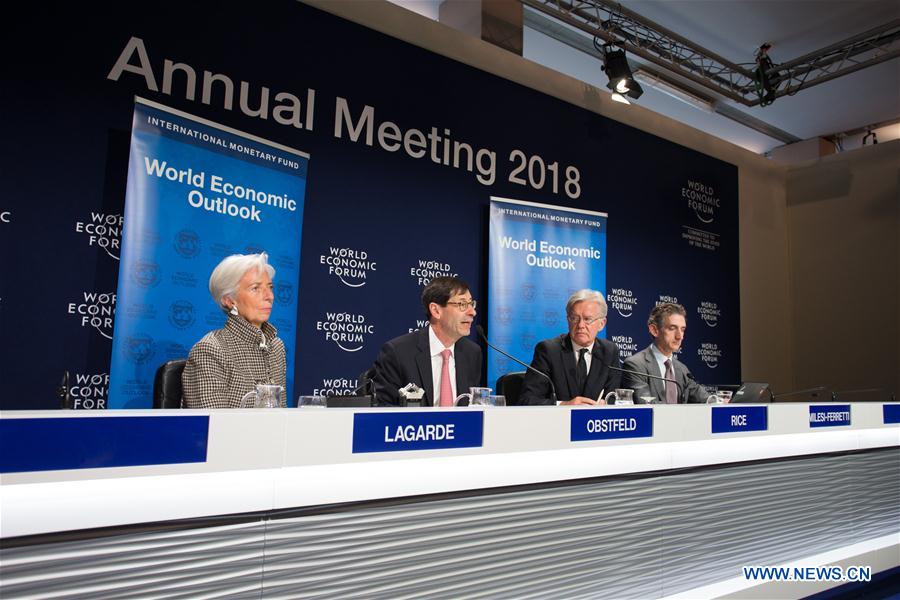
Managing Director of the International Monetary Fund (IMF) Christine Lagarde (1st L) and IMF Economic Counsellor and Director of Research Maurice Obstfeld (2nd L) attend a press conference on Update of the World Economic Outlook in Davos, Switzerland, Jan. 22, 2018. The IMF raised its global growth forecast for 2018 and 2019 on Monday by 0.2 percentage point to 3.9 percent, due to increased global growth momentum and the expected impact of the recently approved U.S. tax policy changes. (Xinhua/Xu Jinquan)
BEIJING, Jan. 23 (Xinhua) -- Optimism over a broad-based global recovery is gaining momentum in Davos, Switzerland, where policymakers and economists around the world have gathered to discuss a "shared future" at the ongoing World Economic Forum.
Any topics on growth inevitably lead to discussions on China, which is playing an increasingly important role in setting the world's economic agenda as a major contributor to the global recovery.
At Davos, the International Monetary Fund (IMF) raised its global growth forecast for 2018 and 2019 by 0.2 percentage points to 3.9 percent in its latest World Economic Outlook report, citing increased global growth momentum.
China is expected to record growth pace of 6.6 percent in 2018, higher than the previous estimate, according to the IMF.
World Bank data showed that China contributed 34 percent to world economic growth from 2012 to 2016, more than the contribution by the United States, European Union and Japan combined, according to Wang Jun, an official with the National Bureau of Statistics (NBS).
"China remains the 'ballast stone and booster' of world economic recovery," Wang said.
China's economy expanded 6.9 percent last year, picking up for the first time in seven years and well above the government annual target of around 6.5 percent.
It's not only the better-than-expected growth number itself that fuelled optimism over the global recovery. China maintained medium-high growth with the help of booming domestic consumption, robust trade, and new technologies, which boosted external demand and international labor productivity, analysts said.
"The Chinese success story is deeply intertwined with the fortunes of the world economy," said David Lipton, IMF first deputy managing director, at a recent forum in Hong Kong.
The world's most populous nation has always been a key market for international companies, but the country's shift toward a consumption-driven economy has made the market even more important.
The contribution of consumption to economic growth reached 58.8 percent, up from 51.8 percent for 2012. At the same time, the Chinese increasingly crave products and services of better quality, creating opportunities for international brands.
"The rising purchasing power of China's middle class and their increasing tendency to accept new brands -- domestic or international-- will reshape the country's consumption market and inject new vitality to growth," said Lu Feng, director of China Macroeconomic Research Center with Peking University.
The global recovery in 2017 was also helped by a rebound in trade. Despite rising anti-globalization sentiment, China has been an active promoter of foreign trade, with its total goods trade volume accounting for 8.8 percent of the world in the first 11 months of 2017, according to World Bank data.
Trade volume reversed the downward trend seen in the previous two years and contributed about 9 percent to China's GDP expansion in 2017, NBS data showed.
"As a trading nation, China is a key partner for over 100 countries: countries that represent 80 percent of global GDP. It is the hub of global supply chains, a magnet for commodity exporters, and a source of final demand," Lipton said.
While consumption or trade activities may still be prone to macroeconomic uncertainties, China is creating new growth drivers that will lead to stable, long-term growth.
NBS data showed that new-energy vehicles, industrial robots, solar power and integrated circuit outshone most other industries in terms of output in 2017, contributing to a pick-up in industrial output growth in 2017.
China plays a leading role in the development of fintech, robotics and artificial intelligence, and is a "pacesetter" for digital commerce, outweighing other countries in terms of online retailing and payments, Lipton said.
With the sun shining on the global economy, it's time to "fix the roof," according to IMF Managing Director Christine Lagarde.
"To maintain a sustainable engine for global growth, China needs to tackle key challenge such as credit risks," Lipton said. "China has a window of opportunity to accelerate economic reforms that can secure sustainable and inclusive growth."















